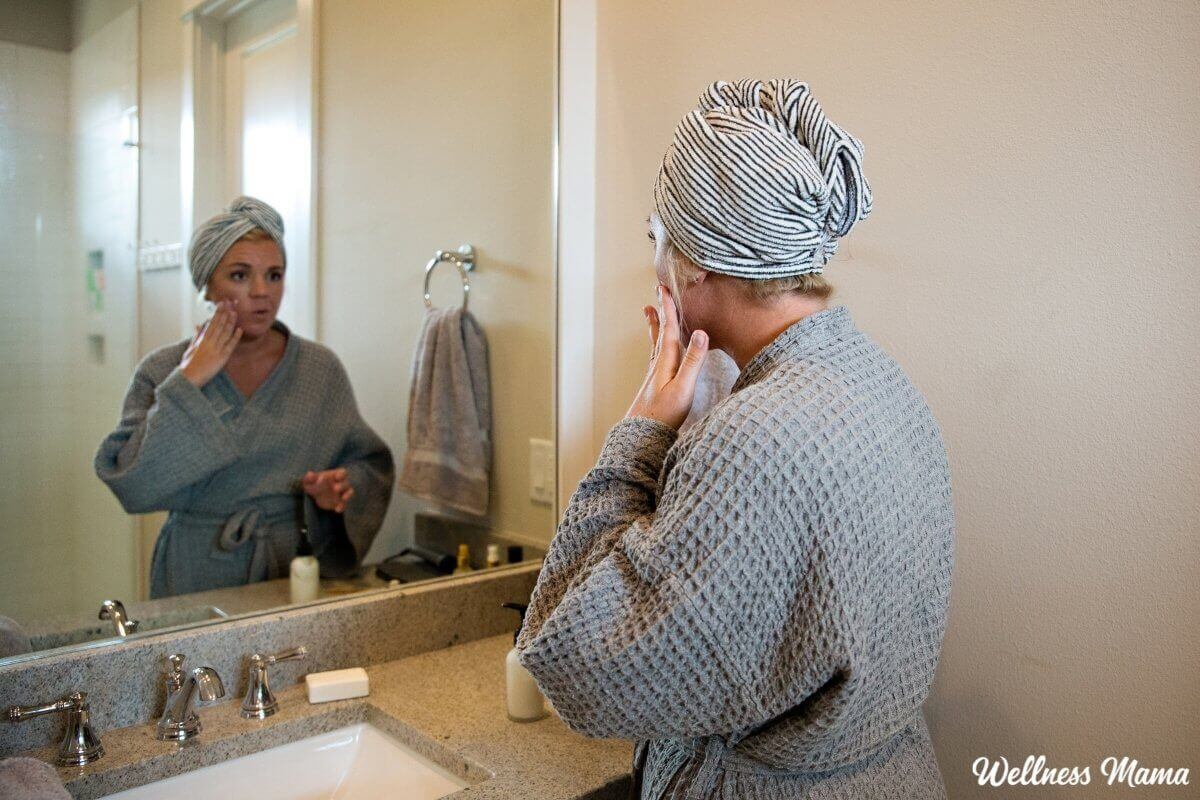
[ad_1]
Table of Contents[Hide][Show]
It seems that (especially for women) switching from regular skincare products to natural versions is one of the toughest natural living steps to take. It’s hard to break free of the age-defying, wrinkle-reversing, acne-preventing claims of conventional products (but certainly easy to say no to some of the ingredients in them!).
Below I’ll take you through some favorite natural skincare recipes from over the years to help you make the switch more easily, and help you decide which natural skincare routine is right for your skin type (DIY or not!)
How to Find the Best Natural Skincare Routine for You
The main skin types are oily, normal, dry, and combination. Different skincare ingredients and combinations work better with these different skin types, though there’s also a lot of crossover.
The good news is a few simple ingredients can be turned into a lot of different customized products. And if you don’t want to DIY, natural skincare companies have figured out solutions that work just as well, even if a little (or a lot) more expensive! (My recommendations coming below.)
Normal or Combination Natural Skincare Routine
I’ve always loved that term, because really, what is “normal” skin anyway? People with this skin type can usually use a variety of different options and still have good results. My skin was more oily when I was younger. As I’ve transitioned to DIY natural skincare options, it’s become more “normal”.
Normal skin types have skin with few imperfections, pores aren’t very noticeable, and skin isn’t overly sensitive. In general, it’s #skincare goals. Combination skin is when there’s normal healthy skin, but patches of dryness or oiliness that need extra attention.
Natural skincare routines (along with healthy lifestyle choices) help nourish and repair combination skin for that flawless look. Those with normal/combination skin don’t need ingredients that are too drying, or anything overly greasy, like straight-up cocoa butter.
Carrier oils good for normal skin include:
- jojoba
- pomegranate
- sunflower
- coconut oil (usually, see note below)
- cranberry seed
- apricot kernel
- argan
- baobab
The following recipes do well with a normal or combination skin type, but the list isn’t exhaustive by any means. You can easily customize the recipes with some of the carrier oils listed above, or use them as-is without issue.
Best Exfoliators for Normal Skin
Best Cleansers for Normal Skin
Best Moisturizers for Normal Skin
Those with normal or combination skin tend to do well with most moisturizing options and often don’t need to add more. If you do need a little something extra, here are some good options.
Natural Skincare for Oily Skin
Switching to gentle and natural skincare options often goes a long way toward removing excess oil production. Eating a healthy diet also helps calm skin inflammation that turns into acne. In the meantime, there are some natural ingredients that can help prevent breakouts and remove excess oil.
There are a few things to consider when choosing ingredients for DIY skincare recipes when working with oily skin:
- We don’t want to increase oil production or clog pores.
- Harsh soaps and cleansers can have a boomerang effect and make oily skin even worse.
- Certain oils and butters are comedogenic, meaning they’ll clog pores, so we don’t want to overdo it on those.
Here are some of the best carrier oils for oily and acne-prone skin. These tend to be lighter and fast absorbing. Most of these are potent oils and can be diluted with either grapeseed or sweet almond oil for cost effectiveness.
Carrier oils good for oily/acne-prone skin include:
- Grapeseed oil
- Almond oil
- Apricot kernel
- Argan oil
- Black cumin seed oil (for acne scars)
- Borage seed oil
- Camellia oleifera (green tea seed oil)
- Castor oil (should be mixed with other oils first)
- Evening primrose
- Jojoba oil
- Pumpkin seed oil
The following recipes do well with a normal or combination skin type, but the list isn’t exhaustive by any means. You can easily customize the recipes with some of the carrier oils listed above, or use them as-is without issue.
Best Exfoliators for Oily Skin
We don’t want to overdo it and strip the oils from the skin, but exfoliation helps reveal fresh skin cells. A simple sugar scrub, salt scrub, or cleansing grains are all good options. Here are some scrubs perfect for oily or acne-prone skin.
Best DIY Cleansers for Oily Skin
- Oil cleansing is my go-to cleansing method for any skin type. Generally, those with oily skin will need a higher amount of castor oil in relation to the other oils to keep skin from becoming too oily during the transition. In general, a half and half mix of castor oil and olive oil or even a 2:1 ratio of castor oil to olive oil seems to work well.
- This foaming face wash can be customized for oily skin.
- A konjac sponge is good for all skin types, but is especially gentle and restorative for acne-prone skin.
- Charcoal and clay facial soap helps detox and absorbs excess oil.
- Sea salt soap is good for oily skin.
Natural DIY Toner for Oily Skin
DIY Moisturizers for Oily Skin
For oil-rich skin, we want something lightweight that won’t clog pores. If you do the oil cleansing method you probably won’t need a moisturizer. Those who prefer a more typical face wash routine can finish it up with one of these oily skin-friendly creams.
Dry or Mature Natural Skincare Routine
Thanks to hormones, teenagers are infamous for having acne and oily skin. According to these scientists, as we age hormones decline, and with it, so does our oil gland production. Oil glands stabilize later into adulthood and slowly decline as we age. For women after menopause, sebum gland production eventually stops altogether.
Dry skin often has very small pores (yay for that!), but you’ll also find redness, flaking, and lines. We need to put moisture and plumpness back into the skin with things like collagen and vitamin C supplements.
Those with dry or aging skin often benefit immediately from natural skincare options. Using natural oils on the skin helps balance oil production and stops dryness in its tracks.
Best DIY Exfoliants for Dry Skin
We don’t usually want to exfoliate dry skin, but sometimes it’s helpful. A gentle homemade sugar scrub or cleansing grains can be a way to add natural oils and gently remove dead skin. Here are some of my favorite gentle exfoliators for a natural skincare routine.
Best DIY Natural Cleanser Recipes for Dry Skin
Best Natural Moisturizer Recipes for Dry Skin
Homemade lotion bars, super-moisturizing homemade lotion, and whipped body butter are all excellent moisturizing options for dry skin types. Plain organic shea butter can also be a simple and effective option.
Other Approaches to Caring for Aging Skin (From the Inside Out)
There are a ton of anti-aging products available but the best options are the ones you take internally. And those expensive collagen creams? They’re pretty much pointless since collagen fibers are too big to absorb through the skin. Here are some tips to boost collagen naturally:
- Use coconut oil or other natural moisturizers (if tolerated; see note below)
- Supplement with gelatin and collagen for plumper skin
- Fish oil has nutrients our skin craves
- Take vitamin C to naturally boost collagen
Facial Massage
Sometimes it’s not about what you put on your skin, but what you do for it! Regular facial massage increases circulation to reduce puffiness, drain lymph fluid, and boosts skin collagen. Here are some facial massage techniques to use for beautiful skin. I highly recommend trying it for all skin types.
A Word on Coconut Oil
The panacea of natural health, coconut oil has a place of honor in my kitchen. I’ve also come up with over 100 uses for coconut oil. That said, it doesn’t work with every skin type. Some people find it really drying, and it can clog pores for some. Other people love it and think it’s the greatest skincare ingredient ever.
A lot of my DIY natural skincare recipes rely on coconut oil, but if it doesn’t work for your skin type then it can sometimes be swapped out with another oil (like carrier oils above by skin type). If it doesn’t work for your face, you may still like it in products used on the body.
Supplements for Skin Care
I’m firmly convinced that what you put in your body is just as important (if not more!) than what you put on it when it comes to skin health. A natural skincare routine should include a healthy diet. I used to have terrible acne. Since changing my diet and supplements, I don’t break out at all and my past scars have healed. The supplements that seemed to have made the biggest difference in skin health for me are:
- Fish Oil– for vitamins A, D, and K, omega-3s, and antioxidants, all of which are great for the skin
- Gelatin– a pre-cursor for collagen, gelatin has made my hair, skin, and nails noticeably stronger and smoother (great for cellulite too!)
- Magnesium– an anti-inflammatory and lacking in many people’s diets. Topical magnesium oil seems to be the most effective for skin health.
Natural Skincare You Can Buy (Not DIY)
If you just want a good pre-made skincare product, here are some healthy options I’ve used and loved. These brands have ingredients I feel good about using, and they make skin feel amazing. You’ll find scrubs, serums, face wash, and more for all the different skin types here.
How do you take care of your skin? What natural solutions have worked best for you? Share below!
Sources:
- Harvard. (2021, May 27). The Nutrition Source: Collagen.
- Shamloul, G., & Khachemoune, A. (2021). An updated review of the sebaceous gland and its role in health and diseases Part 1: Embryology, evolution, structure, and function of sebaceous glands. Dermatologic therapy, 34(1), e14695.
[ad_2]
Source link








